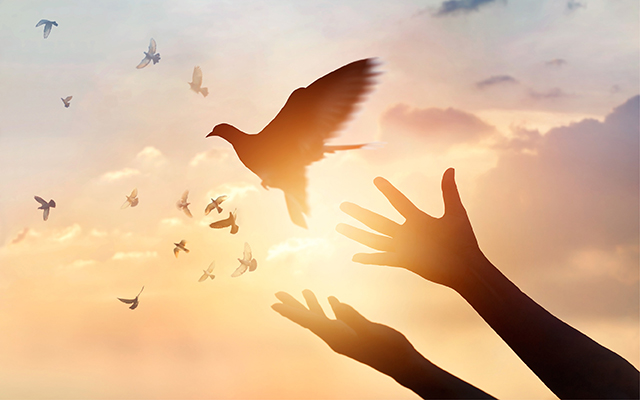Forgiveness is a very powerful tool in letting go of the perspectives that keep us in a limited and limiting way of seeing and being. Forgiveness allows us to move more deeply into the truth of ‘who’ and ‘what’ we are, to eradicate our stories of separation, powerlessness, and being stuck in blaming and victimization. Many of us have a terrifically hard time with forgiveness. We feel that terrible things have happened in our lives, and we are unable to let them go. So, let’s start there, with the experience of forgiveness that many of us have had. When we’re stuck in unconscious reactions, forgiveness is next to impossible. The beliefs we hold about ourselves and our world become the lens through which we view the world, and the way we frame our stories. They limit our perspective and block us from freedom and authenticity. When we’re living at this victim/martyr level of consciousness, hearing about the need to forgive can push us further into limitation.
If we are holding the idea that we’re fundamentally a victim, then “forgiveness” may look like admitting that we are ‘wrong’ or ‘bad’, and that we ‘deserve what we get’. Or it can look like giving up; admitting that the other person is stronger or better and that we cannot ever win. From this level of awareness, forgiveness supposes that we’ve been harmed, or have lost and that we need to forgive the person who harmed us, which can feel like basically admitting that the person who hurt us has won. From the perspective of a victim, forgiveness might also mean pretending that things that happened in the past never happened. This requires forgetting and burying things deep in the shadow.
Either way, this kind of forgiveness can further strengthen the belief in our own victimization because it’s based on the idea that something ‘bad’ needs to be made right by either rationalizing it or burying it. This tends to create more suffering and more limitations. And that is not empowerment. As you begin to identify and let go of all those deeply held beliefs about yourself and the world that keep you in a reactive state, as you experience more authenticity in the safety of a supportive community, as you practice the spiritual principles, as you open to the power of spirit, your experience of forgiveness will begin to shift.
We may think of forgiveness as making peace with the past. That means different things from different perspectives. From a place of non-judgment, the past is what it is. The past cannot be different—we cannot go back and change what happened. But we can alter the way we see it. As the saying goes, “It’s never too late to have a happy childhood.” What this quote means to me is that as we do our healing work, we can look at the past through a different lens. We can truly find a place of gratitude no matter how our childhood looked. This is in no way saying that we don’t sometimes feel pain or sadness about our past. What it is pointing to is that we have the power within ourselves to reframe and find gratitude in any of our past situations.
This shift may not happen overnight, and in certain situations, reconciliation might not be easy. Even as you’re doing the internal work and growing in awareness, you may still tend to experience forgiveness as directed outward, focusing on how someone, even you, has/have treated others rather than on your own inner movement. If your experience of forgiveness pushes you back into your stories of victimhood that may mean you need to do some more work to help break the cycle. Or it may just mean you need to ask yourself some further questions, to reap the benefits of all the inner work you’ve been doing. So, let’s look at some of those questions.
Think of a situation in which you find it difficult to forgive. What is the story you have been telling about that situation? Where have you been especially attached to that story—what belief does it support? Is there another way to look at it? Keeping that situation in mind, what happens when you let go of the idea that one story is ‘right’? What happens when you approach what happened with the neutrality of an impartial observer? Can you let go of your initial reactive story about the situation and open yourself to other possible perspectives? If you can, what happens when you do that?
When we let go of the ego’s attachment to a particular story or a specific verdict about who is ‘right’ and who is ‘wrong’, could it be that we no longer even need to forgive? If we release our hold on ‘right’ or ‘wrong’, it’s easier to see people as reacting and responding out of their own perspectives, their own limited experiences and imperfect knowledge. It’s then a relatively short step to move from guilt, remorse, and forgiveness to something more like responsibility, resolution, and reconciliation. We don’t need to ignore the pain in our lives. For instance, we would not stay in an abusive relationship out of the idea that ‘There is no guilt here; whatever happens, happens’. We would not believe that we are no longer accountable for our actions because, ‘Hey, I’ve let go of ego’. That is not witness consciousness. It’s possibly denial.
Of course, we’re accountable. Of course, we might still feel pain. When we feel hurt, our first reaction might be to feel anger, to lash out, to want to harbor a grudge. When we experience those reactions in conscious awareness, we might still feel that pain, but then we go on to witness it, to observe our reactions and then choose how to respond, letting go of the need for someone to be wrong or right. Similarly, if we do something that causes pain to someone else, we may still feel an initial trigger of shame and maybe from that feeling springs defensive anger. In conscious awareness, we’re able to look at these reactions compassionately, which empowers us to then move beyond them to choose the next step.
When we arrive at the mystical level of consciousness, of recognizing our oneness with life, there is no longer anything to forgive. This place of alignment with ultimate reality acknowledges that the cause of anyone’s harmful behavior is in separation from their essential self. When we reach a state of oneness with source, we recognize that there’s nothing to forgive because we can see that everything that’s happened in our life has played a part in our transformation; it’s been useful in getting us where we are. And as we grow in conscious awareness, forgiveness becomes more of a natural process. At this level of awareness, we shift from forgiveness to compassion and gratitude.

TJ Woodward is a revolutionary Recovery Expert, inspirational speaker, educator, addiction treatment specialist, and bestselling author of Conscious Recovery: A Fresh Perspective on Addiction. TJ is a featured thought leader on wholehearted.org along with Brené Brown, Marianne Williamson, Dr. Gabor Maté, and Mark Lundholm, as well as a featured thought leader in the upcoming docuseries Addiction Revealed due to be released this year.




